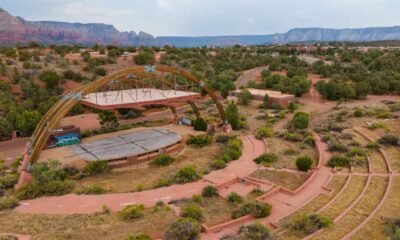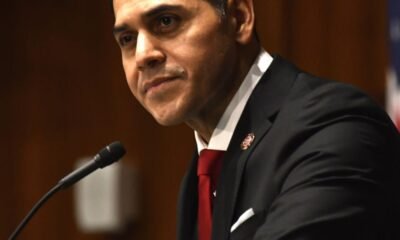aps
Big Park Council Sparks Debate Over APS Powerline at Recent Meeting

A significant gathering took place at the Village of Oak Creek Church of the Nazarene on Wednesday, February 19, with between 175 and 200 individuals attending a meeting hosted by the Big Park Regional Coordinating Council (BPRCC). The primary focus was Arizona Public Service’s (APS) proposal for a new 13.7-mile transmission line linking the Village of Oak Creek (VOC) to McGuireville.
The proposal, initiated in 2019, involves an underground section along Beaverhead Flat Road that transitions to an overhead line near the Kel Fox Trail. This aspect of the project requires realigning approximately 3.6 miles of the trail.
Despite confirmations from key personnel, including District Ranger Alex Schlueter and APS representatives, Schlueter informed the BPRCC via email the evening before the meeting that he would not attend. In his email, he expressed concerns about the meeting’s structure, indicating it might foster unrealistic expectations and frustration within the community. He emphasized that the Forest Service was not collecting public comments beyond specific objections from those who had submitted timely feedback during designated periods.
APS representatives also withdrew from participation shortly before the meeting commenced. Public Affairs Manager Darla Deville mentioned that their role was primarily to listen, following a planned introductory segment from the Forest Service.
Neither the BPRCC leaders nor the attendees were informed of these withdrawals beforehand, leading to a disappointing meeting atmosphere. “Unfortunately, at the very last moment, [the Forest Service] chose not to attend; they are not here tonight,” noted BPRCC President Susan Barber.
The lack of communication drew frustration from the audience, who reacted with jeers upon learning of the absences. Barber later defended the organization’s last-minute scrambling to revamp the presentation, noting their all-volunteer nature and competing commitments.
Concerns from residents centered on the potential fire risks and aesthetic impacts of the proposed overhead lines. In response to public comments, the Forest Service stated that the transmission line’s scenic effects on nearby residences were likely minimal. Their analysis discounted significant declines in property values or substantial wildfire risks, citing various environmental factors.
Residents expressed concerns about reliability, asking if the new line would fall under APS’s Public Safety Power Shutoff program during high fire-risk periods. APS spokesperson Yessica Del Rincón affirmed that this line would not be included in the program but emphasized that it would receive consistent maintenance as per their wildfire mitigation strategy.
Yavapai County District 3 Supervisor Nikki Check attended the meeting and pledged to address local concerns in her upcoming discussions with the Forest Service.
In a recent development, the BPRCC secured $10,000 to support legal research from Earthrise, an environmental nonprofit law clinic. This funding aims to evaluate potential legal avenues concerning the transmission line, although BPRCC volunteers have not committed to pursuing litigation until they receive a response from the Coconino National Forest regarding a prior objection letter and an ongoing Freedom of Information Act request.
Schlueter mentioned that if BPRCC opts to file an objection, a resolution meeting could follow at the discretion of the reviewing official. The Coconino National Forest’s website indicates that a final decision regarding the transmission line is anticipated in May, with construction slated to begin later in June.


















